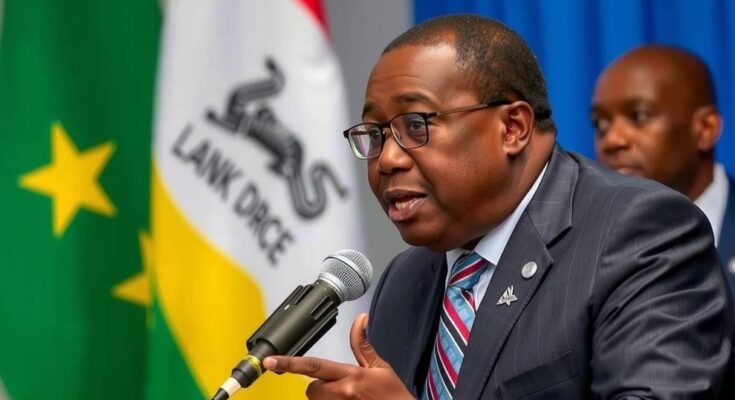Rwanda’s Foreign Minister has expressed concerns regarding the commitment of the Democratic Republic of Congo to the peace process following a recent agreement in Luanda. Increased militarization and inflammatory rhetoric from DRC officials could undermine the peace efforts aimed at stabilizing Eastern DRC. The ongoing dialogue facilitated by Angola seeks to address these challenges and promote cordial relations between the two nations.
The ongoing peace efforts in the Eastern Democratic Republic of Congo (DRC) face significant challenges due to the alleged lack of political will and good faith on the part of the DRC government. Rwanda’s Minister of Foreign Affairs, Amb. Olivier Nduhungirehe, has voiced concerns following a recent agreement signed in Luanda, Angola, aimed at stabilizing the Eastern DRC. The discussions highlighted the urgent need for DRC to exhibit genuine commitment to the peace process, particularly amidst ongoing tensions and military actions in the region.
During a virtual meeting, Minister Nduhungirehe reiterated Rwanda’s commitment to the Luanda process but emphasized that DRC’s actions undermine the established agreements. He pointed to increased militarization by the DRC and the continuation of hostile rhetoric from DRC officials as significant barriers to reaching a sustainable resolution. The situation was further compounded by inflammatory statements from DRC leaders, which could foster further animosity and conflict.
The concerns raised were not isolated incidents but part of a broader pattern that, according to Nduhungirehe, reflects a serious lack of willingness from the DRC and may derail the fragile peace process. He explicitly referenced remarks made by high-ranking DRC officials, which not only instigate conflict but also signal a regression rather than progress in diplomatic relations between the two nations.
Amb. Nduhungirehe’s statements and the context of an unstable political landscape in the DRC set the stage for continued discussions aimed at addressing the root causes of the conflict. Despite these challenges, Rwanda remains hopeful that open dialogue facilitated by Angola can pave the way for peace and cooperation to be restored in the region.
The article centers on the peace process between Rwanda and the Democratic Republic of Congo in the context of ongoing violence in Eastern DRC. The Luanda Process was initiated to address the security concerns affecting the region, but significant obstacles remain. The recent agreement signed between Rwanda and DRC is seen as a potential turning point, yet concerns about the willingness of the DRC government to adhere to it raise alarm bells among stakeholders. The complexities of the geopolitical environment, combined with inflammatory comments from government officials, complicate the interaction between these two neighboring countries. Political tensions have persisted for years in the region, particularly in Eastern DRC, where various armed groups have operated, creating instability that affects both Rwandan and Congolese citizens. Thus, the continued dialogue and negotiation between the two countries are essential for long-term stability.
In summary, the ongoing efforts concerning the peace process between Rwanda and the Democratic Republic of Congo are jeopardized by a perceived lack of political will and good faith from the DRC side. Minister Nduhungirehe has expressed grave concerns over recent actions by DRC officials that contradict the peace agreements created in Luanda. The future of the Luanda Process seems contingent upon the DRC’s willingness to engage constructively, demonstrating a commitment to achieving lasting peace in the Eastern DRC region. The diplomatic dialogue remains essential to addressing the multifaceted issues causing instability in the area.
Original Source: www.ktpress.rw




